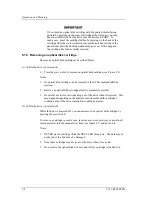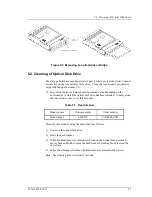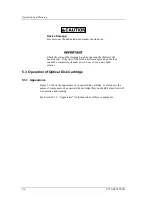
4.3 Settings
C156-E228-02EN 4-9
(3) Write cache mode
The write cache mode can be set. The write cache mode can also be enabled or
disabled by the MODE SELECT command.
When the write cache mode is enabled, the cache control page is added to the code
page of the mode parameter even if the SCSI-1 is set. Table 4.3 shows the settings
of the write cache mode.
Table 4.3 Write cache mode setting
Write cache mode
SW1-05
Write cache is enabled at executing the
WRITE/WRITE AND VERIFY command.
ON
Write cache is disabled at executing the
WRITE/WRITE AND VERIFY command
OFF (*1)
*1
Setting when shipped
When the write cache feature is enabled, a write error is reported at
the completion status of next command. At a system so that the
initiator retries the command, a retry process may be failed.
(4) Device type mode
The device type settings, which are returned when the INQUIRY command is
issued to the optical disk drive, are shown below.
Table 4.4 Device type mode settings
Device type
Setting terminal (SW1-06)
X‘00’ (Direct access device)
OFF
X‘07’ (Optical memory device)
ON (*1)
*1
Setting when shipped
(5) Spindle automatic stop mode
Normally, with the cartridge loaded, the spindle rotation is maintained until the
spindle is instructed to stop by the START/STOP UNIT command. The spindle
auto stop function automatically stops the spindle after the command has not been
issued from the host for about 33 minutes (default value). When the command is
issued from the host with the spindle automatically stopped, the optical disk derive
turns the spindle again and performs processing in the same manner as in a ready
state without posting a not ready state.
Summary of Contents for MCM3064SS
Page 1: ...C156 E228 02EN MCM3064SS MCM3130SS MCP3064SS MCP3130SS OPTICAL DISK DRIVES PRODUCT MANUAL ...
Page 4: ...This page is intentionally left blank ...
Page 8: ...This page is intentionally left blank ...
Page 20: ...This page is intentionally left blank ...
Page 30: ...This page is intentionally left blank ...
Page 42: ...Specifications 2 12 C156 E228 02EN Figure 2 3 Example of alternate processing ...
Page 47: ...3 2 Mounting Requirements C156 E228 02EN 3 5 Figure 3 2 Outer dimensions 1 of 2 ...
Page 49: ...3 2 Mounting Requirements C156 E228 02EN 3 7 Figure 3 3 Outer dimensions 1 of 3 ...
Page 51: ...3 2 Mounting Requirements C156 E228 02EN 3 9 Figure 3 3 Outer dimensions 3 of 3 ...
Page 82: ...Installation 4 16 C156 E228 02EN Figure 4 6 SCSI connection check ...
Page 84: ...This page is intentionally left blank ...
Page 98: ...This page is intentionally left blank ...
Page 148: ...SCSI BUS 7 46 C156 E228 02EN Figure 7 21 Bus phase sequence 1 of 2 ...
Page 149: ...7 8 Bus Sequence C156 E228 02EN 7 47 Figure 7 21 Bus phase sequence 2 of 2 ...
Page 158: ...This page is intentionally left blank ...
Page 166: ...This page is intentionally left blank ...
Page 168: ...This page is intentionally left blank ...
Page 169: ......
Page 170: ......
















































